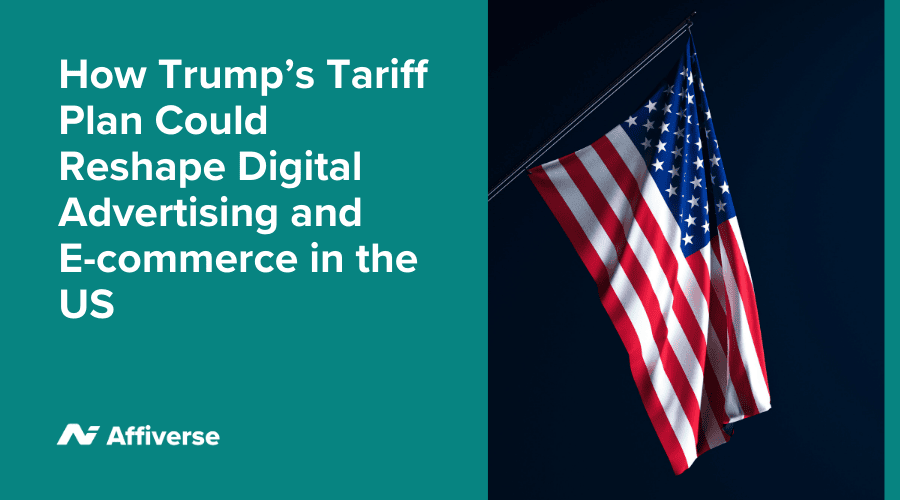The digital advertising industry is bracing for potential upheaval as US President Donald Trump signals a tougher stance on Chinese e-commerce platforms like Temu and Shein.
His proposed tariff increases and the potential suspension of the “de minimis” exemption – which currently allows imported goods under $800 to enter the US duty-free – could have a significant impact on the way these fast-growing brands operate.
For platforms like Facebook, Instagram, and Google, this presents an unexpected challenge. Chinese e-commerce giants have become some of the biggest digital advertisers in the US, spending heavily on performance marketing campaigns to fuel their rapid growth.
If new tariffs disrupt their business models, the ripple effects could extend far beyond e-commerce, affecting ad revenues, affiliate marketing networks, and consumer shopping habits.
The Role of Chinese E-commerce Giants in US Digital Advertising
In recent years, brands like Temu, Shein, and AliExpress have flooded the US market with ultra-low-cost goods, aggressively marketing their products through targeted digital ads. These companies have taken full advantage of the de minimis exemption, shipping individual packages directly to US consumers without incurring hefty import duties.
The impact of this business model on digital advertising has been enormous. According to reports, Temu and Shein account for up to 4% of total ad spending for Google and Meta, making them key players in the US digital ad economy. Their strategy revolves around high-volume, data-driven ad campaigns that optimise for direct conversions, allowing them to scale rapidly.
If Trump’s proposed policies take effect, the cost structure underpinning their success could change overnight. With higher tariffs and stricter import regulations, Chinese retailers may be forced to cut back on marketing spend, raise prices, or shift focus to other markets – all of which would have major implications for digital advertisers.
How Tariff Increases Could Impact the US Advertising Market
For companies like Meta and Google, Chinese e-commerce firms have been a lifeline for ad revenue at a time when many Western brands have pulled back on spending.
The post-pandemic advertising market has been unpredictable, with economic uncertainty leading many traditional retailers to scale back digital ad budgets. In contrast, Shein and Temu have continued to buy ad space aggressively, helping to stabilise revenue for major tech platforms.
If tariffs and import restrictions disrupt this flow of advertising dollars, platforms like Meta and Google may face a shortfall. This could have several knock-on effects:
- Ad Prices Could Decline: With less competition for ad placements, businesses that continue to advertise may find lower costs per click and impression.
- Affiliate Marketing Earnings May Drop: Affiliates who rely on commissions from promoting Temu and Shein products through platforms like TikTok, Facebook, and Google Shopping may see reduced payouts if sales slow.
- Retailers May Step Up Their Advertising: Traditional US-based retailers could view this as an opportunity to recapture lost market share, potentially increasing their own ad budgets to fill the gap.
However, the biggest challenge will be whether US retailers can replicate the aggressive direct-to-consumer strategies that Chinese brands have perfected. Shein and Temu rely on rapid product launches, ultra-targeted advertising, and seamless social commerce integration – areas where many US retailers still lag behind.
The Potential Impact on Consumers and E-commerce Trends
While this debate is playing out in the policy and business spheres, the real impact will ultimately be felt by consumers. One of the key reasons for Shein and Temu’s explosive growth is the affordability of their products. By eliminating middlemen and leveraging the de minimis loophole, they have been able to offer everything from clothing to home goods at unbeatable prices.
If tariffs force these companies to increase costs, it could lead to:
- Higher Prices on Popular Online Marketplaces: Consumers accustomed to bargain shopping on Temu and Shein may face price hikes or longer delivery times.
- A Shift Back to Domestic Retailers: With Chinese imports facing regulatory pressure, US retailers like Walmart, Target, and Amazon could benefit from a renewed interest in locally stocked products.
- Growth in Alternative Cross-Border E-commerce Strategies: If tariffs hit direct-to-consumer shipments, Chinese brands may invest more in local warehousing, partnerships with third-party sellers, or alternative logistics models to bypass restrictions.
Ultimately, while higher tariffs may slow the momentum of Chinese e-commerce brands, they are unlikely to disappear from the market entirely. Instead, these companies may look for ways to adapt, either by shifting supply chains, finding new advertising models, or passing costs onto consumers.
What Happens Next?
At this stage, it remains unclear whether Trump’s tariff plans will be implemented. Political and economic factors will likely influence the decision, especially given the potential impact on inflation and consumer spending in the US.
However, even the discussion of these changes is enough to cause uncertainty in digital marketing and e-commerce sectors.
If restrictions on Chinese e-commerce brands do take effect, it will likely lead to:
- Changes in Digital Ad Spending Patterns: Platforms like Meta, Google, and TikTok will need to diversify their advertiser base to fill potential revenue gaps left by Shein and Temu.
- New Strategies for Cross-Border Retailers: Chinese brands will likely explore alternative ways to sell into the US market, potentially by setting up domestic supply chains.
- Opportunities for Affiliate Marketers: While some may lose revenue from promoting Chinese brands, others could benefit from an increase in domestic e-commerce partnerships.
In any case, the situation highlights how deeply intertwined global trade and digital marketing have become. Decisions made in Washington on tariffs and trade policy now have immediate and far-reaching effects on online advertising, affiliate marketing, and consumer shopping habits.
For businesses involved in e-commerce and digital advertising, staying agile and informed will be key to navigating these potential changes. If Chinese retailers adjust their models or shift focus, there may be new opportunities for brands, marketers, and affiliate partners who are ready to adapt and take advantage of the evolving landscape.




















